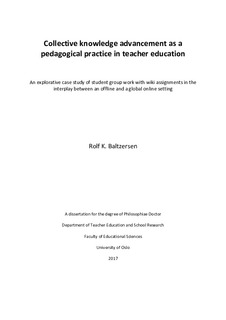| dc.contributor.author | Baltzersen, Rolf K. | |
| dc.coverage.spatial | Norway, Oslo | nb_NO |
| dc.date.accessioned | 2018-02-07T13:12:56Z | |
| dc.date.available | 2018-02-07T13:12:56Z | |
| dc.date.issued | 2017-12 | |
| dc.identifier.citation | https://www.duo.uio.no/handle/10852/59802 | nb_NO |
| dc.identifier.issn | 1501-8962 | |
| dc.identifier.uri | http://hdl.handle.net/11250/2483294 | |
| dc.description.abstract | ENGELSK:
The aim of this dissertation was to describe and analyze collective knowledge advancement (CKA) as a pedagogical practice in teacher education. The background is that Internet permits new types of authentic knowledge production that make it possible for anyone to make contributions (e.g., Wikipedia). In the future, it is expected that schools and teacher education institutions will let students make contributions in these online settings to a greater degree.
The present study explored how student groups worked with different wiki assignments in one specific teacher education course. A range of different types of data (group interviews, video data, screen capture data, and wiki log data) were collected. By utilizing two theoretical concepts (germ cell and contradictions) from cultural-historical activity theory, help was identified as the singular entity that exhibited the simplest possible characteristics of CKA as a pedagogical practice. On the basis of these findings, it was concluded that three different types of help are particularly important. These include help as informal peer feedback, which relies on spontaneous verbalization of ongoing thoughts, and help that is provided through the open publication of student work in the online setting. The third type of help requires that all students be assigned as helpers for each other so they can share the workload more equally.
This dissertation contributes to educational research in five ways. First, the findings indicate that different types of informal teaching are important components of CKA as a pedagogical practice. Second, the results also describe new types of authentic learning that build on interactions between students and outsiders in the online setting. Third, the findings suggest that it is possible to turn campus-based teaching into a “practicum period” by letting students experiment with new types of collaboration. Fourth, the findings show that a polycontextual pedagogical practice emerges in the interplay between an offline setting and several different online settings. Finally, the analysis demonstrated that the notion of a germ cell provides a powerful means of studying different types of pedagogical practice.
NORSK:
Denne avhandlingen har som formål å beskrive og analysere kollektiv kunnskapsutvikling som en pedagogisk praksis i lærerutdanningen. Bakgrunnen er at internett nå muliggjør mange nye typer autentisk kunnskapsproduksjon der hvem som helst kan være med å bidra (for eksempel Wikipedia). Man vil kunne forvente at både lærerutdanning og skoler i større grad vil la elever være aktive bidragsytere i slike online-miljø.
Denne forskningsstudien utforsker hvordan studenter samarbeider når de løser ulike wikioppgaver på et studium i lærerutdanningen. Flere ulike typer data har blitt samlet inn (gruppeintervju, videoopptak av studentsamarbeid, skjermaktivitet på datamaskin og wikilogg). Ved å ta i bruk to teoretiske begreper (kimcelle og kontradiksjoner) fra kulturhistorisk aktivitetsteori, så blir hjelp identifisert som den minste meningsfulle enheten som beskriver hva som karakteriserer kollektiv kunnskapsutvikling som en pedagogisk praksis. Studien viser at særlig tre spesifikke typer hjelp er viktig. Den første typen er hjelp som skjer i form av uformelle tilbakemeldinger mellom medstudenter. Her oppstår den spontant i verbale samtaler. Den andre typen er hjelp som blir gitt ved åpen publisering av studentarbeid i ulike online-miljø. Det tredje typen hjelp består i at alle studenter bør ha en rolle som hjelpere for hverandre i undervisningen slik at arbeidsbyrden blir fordelt mer rettferdig.
Denne avhandlingen bidrar til utdanningsforskningen på fem ulike måter. For det første viser den at ulike typer uformell undervisning er sentrale i en pedagogisk praksis som bygger på kollektiv kunnskapsutvikling. For det andre beskriver funnene en ny type autentisk læring som bygger på kommunikasjon mellom studenter og utenforstående i et online-miljø. For det tredje viser funnene at lærerstudentene kan få en form for “praksistrening” på campus ved å eksperimentere med nye samarbeidsformer. For det fjerde viser funnene at den pedagogiske praksis kan analyseres som polykontekstuell fordi studentene deltar i både et lokalt offline-miljø og flere online-miljø. For det femte viser analysen at begrepet kimcelle kan brukes for å prøve å få en dypere forståelse for hva som kjennetegner ulike pedagogiske praksiser. | nb_NO |
| dc.language.iso | eng | nb_NO |
| dc.publisher | Oslo: University of Oslo, Faculty of Educational Studies, Department of Teacher Education and School Research. | nb_NO |
| dc.relation.ispartofseries | Series of dissertations submitted to the Faculty of Education, University of Oslo;276 | |
| dc.subject | Læring | nb_NO |
| dc.subject | Lærerutdanning | nb_NO |
| dc.subject | Lærerstudenter | nb_NO |
| dc.subject | Kunnskap | nb_NO |
| dc.subject | Undervisning | nb_NO |
| dc.subject | Internett | nb_NO |
| dc.subject | Wiki | nb_NO |
| dc.subject | Prosjektarbeid | nb_NO |
| dc.subject | Aktivitetsteori | nb_NO |
| dc.subject | Collaborative learning | nb_NO |
| dc.subject | Cultural-historical activity theory | nb_NO |
| dc.title | Collective knowledge advancement as a pedagogical practice in teacher education. An explorative case study of student group work with wiki assignments in the interplay between an offline and a global online setting | nb_NO |
| dc.type | Doctoral thesis | nb_NO |
| dc.description.version | publishedVersion | nb_NO |
| dc.rights.holder | Forfatter Rolf K. Baltzersen | nb_NO |
| dc.subject.nsi | VDP::Samfunnsvitenskap: 200::Pedagogiske fag: 280::Allmennpedagogikk: 281 | nb_NO |
| dc.source.pagenumber | 409 | nb_NO |
